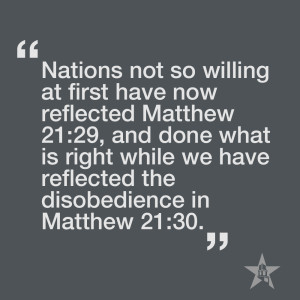News outlets are currently flooded with information regarding the Syrian refugees. Millions face war in Syria, hatred and racism in Turkey, abject poverty in Lebanon and Jordan, and often without the means to relocate.
 Even as I write, Western states such as Austria, Germany, and Hungary are bringing troops and police to tighten border control against the growing waves of migrants. Everywhere the influx of refugees goes, it seems they are received with animosity, or at best with cold regard. Consider the stun grenades in Macedonia, riot shields and beatings at Hungary’s Serbian border, or the EU’s plan, approved earlier this week, to seize and divert ships smuggling migrants across the Aegean Sea. Despite such obstacles, between eight hundred thousand and one million refugees are expected in Germany by the end of 2015.
Even as I write, Western states such as Austria, Germany, and Hungary are bringing troops and police to tighten border control against the growing waves of migrants. Everywhere the influx of refugees goes, it seems they are received with animosity, or at best with cold regard. Consider the stun grenades in Macedonia, riot shields and beatings at Hungary’s Serbian border, or the EU’s plan, approved earlier this week, to seize and divert ships smuggling migrants across the Aegean Sea. Despite such obstacles, between eight hundred thousand and one million refugees are expected in Germany by the end of 2015.
It should not surprise us that the human heart is always and everywhere prone to sins, such as bigotry. (Yes, even a Westerner’s heart.) From regions such as the Balkans or Middle East we might be accustomed to reports of rampant nationalism and violence. But is it harder to hear of Europeans treating the migrants as threats to their economy, or perhaps even to racial or religious comfort?
Sadly, this crisis reflects no better on America than on Turkey or Hungary. In fact, the Turks, Hungarians, and others have done far more for the Syrians than we. Roughly two million refugees have fled to Turkey, while the U.S. has admitted some fifteen hundred. On Sunday 13 September, Austria permitted fourteen thousand to enter from Hungary. Smaller, less capable nations are willing to allow some refugees in at their border. Our border has been effectively shut. The Turks are in no way fond of them, but our government promised earlier this year to accept close to half those the UN is looking to resettle. Nations not so willing at first have now reflected Matthew 21:29, and done what is right, while we have reflected the disobedience in 21:30.
 Why has our government, one of the world’s most capable and well-funded, balked at the idea of accepting even 10,000 refugees next year, while Germany has accepted 450,000 so far this year? The main reasons given are fear of ISIS operatives posing as refugees, and a desire to care for the most pressing needs, such as food and medical aid.
Why has our government, one of the world’s most capable and well-funded, balked at the idea of accepting even 10,000 refugees next year, while Germany has accepted 450,000 so far this year? The main reasons given are fear of ISIS operatives posing as refugees, and a desire to care for the most pressing needs, such as food and medical aid.
Yet, is this reasonable? We must note that the U.S. has sent over $4 billion to the response efforts, according to the National Security Council cited in the BBC. But giving our brother a fish is not the same as teaching. Money is not lasting security in the face of civil war and terrorism; somewhere, refugees need new homes altogether. Granted, food, water, and shelter for the immediate future requires funding. But to do no more amounts to little, similar to the foolish faith described in James 2:15-17. According to the International Business Times, applications to the U.S. Refugee Admissions Program normally take up to two years; but this year the program
has in large part been indefinitely suspended. Given the exigency of the Syrian situation, this effectively says “Go in peace, keep warm, and eat your fill”, while we do nothing for their fear, hunger, and danger.
The U.S. is accepting a meagre handful of fewer than two thousand souls. Our former promise to take sixty-five thousand this year, out of one hundred thirty thousand the U.N. wishes to relocate, is reduced to ten thousand in 2016. How must this impact our credibility, that we conveniently adjust our help for other nations? President Obama promised we would be the leading nation in allaying the crisis. Yet that hard-won monicker belongs to Germany, and Britain and France, too, have promised more than double our offer. Worse than any ramifications in our relations with Europe, however, is the faithlessness we have shown to the refugees themselves. I pray that we will turn and serve the destitute, that through us the nations might be blessed.

You seem like a nice person and your intentions are good, but the situation is a bit more complicated than you make it out to be. First, the countries you mention have all done something–some have done a lot, others less so, but even Hungary has let over a hundred thousand through in recent weeks, at great expense. You have to realize that these are people who are just showing up en masse. According to the UNHCR, 72% are young men, and by the looks of things, they are right–a good number are violent, as recent events on the borders show, and they have also been very demanding and in many cases arrogant and threatening. Violent protests on Lesbos have erupted because tens of thousands showed up and the Greeks were not prepared–as though that’s their job on Lesbos to be prepared with all the facilities needed to take care of tens of thousands of Middle Easterners. In Italy tour buses have been attacked and ransacked, and throughout Europe the streets are filling up with impoverished people with nowhere to go. These issues existed even BEFORE the recent exodus from the Middle East–a nice film that depicts this phenomenon is Vice News’ “Europe or Die”. It’s not a question of being kind and empathetic or cold and uncaring–it’s simply that there are too many migrants. And worldwide there are a good 50 or more million refugees, and potentially hundreds of millions of economic migrants, as a lot of the people now sweeping into Europe are. Resettlement is simply not the solution to the world’s refugee problem. Conflict resolution and repatriation are. We have to take care of these people in camps in the Middle East and find a political solution to end the war and get them home. And provide massive assistance to rebuild Syria. We also have to work with our allies to eliminate Islamic State, obviously. Afghans, Pakistanis, Bangladeshis and other simply have to be sent back. Even the Europeans will do that because they will not accept economic migrants if at all possible. Finally, even if the US take a couple hundred thousand, that’s a drop in the bucket. It will make very little difference overall. It will make a difference to those individuals, but don’t overestimate the favor. Many people are not better off in an alien culture over time. Our resources are better invested in the region itself.